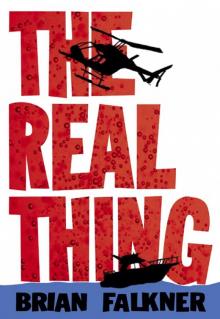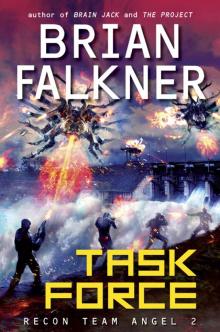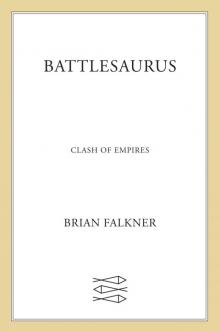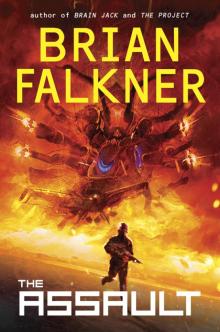- Home
- Brian Falkner
Clash of Empires Page 9
Clash of Empires Read online
Page 9
“I fear they simply do not understand her,” Willem says. “They cannot comprehend who she is or what she has suffered.”
“Which is?”
“She is a child of the forest,” Willem says. “For her, safety lies in the natural world, in trees and streams and caves. She cannot cope with a city such as London. She may not have been mad when she came here, but confinement in an asylum, in this city, will surely drive her mad if she is not released soon.”
“It is true,” Frost says.
“And I need her, if this mission is to succeed,” Willem says. “We must again travel through the Sonian Forest, using the secret ways that only she knows.”
“But I am not sure what I can do,” the earl says. “The principal physician at Bedlam is Thomas Monro, a most single-minded man.”
“We met him,” Frost says.
“He has consulted on the sad case of our dear, demented king, and is held in high regard within his profession,” the earl says.
“Surely he would listen to you,” Frost says.
The earl glances over at Arbuckle and they smile at some private joke.
“Most unlikely,” the earl says. “I have many times decried the conditions, and the treatment of inmates, at Bedlam. I have been a vocal supporter of St. Luke’s Hospital, which makes me an enemy to Bedlam. I am afraid that Doctor Monro would probably do the opposite of what I say.”
“Then tell him not to release her,” Willem says.
The earl just smiles. “If I ask him and he refuses, then I feel it would take no less than an order from the king to obtain her release, and I fear such an order would be a long time coming, considering the king’s current state of health.”
“So there is nothing you can do?” Frost asks.
“Officially, no,” the earl says. “Unofficially, if you were to somehow spirit the girl out of that godforsaken place, then I could find a place for her where Monro cannot reach her.”
“Wenzel Park?” Arbuckle asks.
“My thoughts exactly,” the earl says. “My country estate. It is not far from the city yet has wide stretches of forest. Perhaps she would feel at home there.”
“It sounds wonderful, but if we cannot get Héloïse out—” Willem begins, but is cut off by Frost.
“A kind and generous offer,” Frost says.
“I am sure you will find a way,” the earl says. “The building is a collapsing morass of broken walls and uneven floors. Many doors do not even close, let alone lock. And most of the staff have already shifted to the new hospital, leaving only a skeleton staff at the old.”
“Patients often escape and are found wandering in the streets,” Arbuckle adds.
“That may be the case for ordinary inmates,” Willem says. “But I fear that Monro will be taking special care with Héloïse.”
“You mean he suspects our plans?” Frost asks.
“Yes,” Willem says.
“Then he may move her sooner than we think,” Frost says.
“You must not wait until she is transferred to the new asylum,” the earl says. “The doors there are strong and it has high walls. Once she is inside, you will never get her out.”
Willem thinks for a moment, then says, “Can you find out when she will be moved?”
“My man can make some discreet inquiries,” the earl says, and Arbuckle nods.
“Not too discreet,” Willem says, and for the first time that day, he smiles.
A PROUD AND LUCKY SHIP
“The little fish is about to see the hook,” Lavigne says. “We shall watch her squirm.”
Thibault does not reply, but he smiles, briefly.
A British frigate had appeared off their starboard bow just after dawn, materializing out of a rainsquall. She had probably located the French invasion fleet earlier but held position, undetected, until first light when she could gauge their course and the number of ships.
The dark and the weather could not conceal the frigate for long, and just after five bells she was spotted by lookouts on the Magnanime, a seventy-four-gun ship of the line on the French fleet’s eastern flank.
The frigate had maintained her position, unaware of the trap that was already being laid for her.
There are eighteen ships in the French fleet. Nestled in the center are the three first-rate ships of the line, the Duc d’Angoulême, the Montebello, and the Impérial, each with a hundred and ten guns, each towing a heavy barge with its valuable cargo. They are protected by an outer screen of second- and third-rate ships.
At the rear are two sheep in wolves’ clothing. The Canard and the Mouette: the duck and the seagull. These ships are freighters, lightly loaded and fast, able to fly across the tops of the waves, unencumbered by the apparatus of war. They are not weighed down by cannon, barrels of gunpowder, and racks of heavy cannonballs, nor by a large crew and all the necessary provisions that entails.
Each of the freighters is disguised as a heavy man-o’-war. The gun ports are merely painted on and the cannon on their top deck are made of wood, but on the heaving sea in the first light of morning it would take the eye of an eagle to tell the difference.
At the first sighting of the British ship, Thibault had ordered the fleet to bear away to the northwest.
The Canard and the Mouette dropped back, as if unable to keep pace, although in reality they are the fleet’s fastest ships.
The British frigate followed the fleet, unconcerned about two lumbering men-o’-war fading away to the rear.
As soon as the rain and mist had closed in around them, the Canard and the Mouette had changed course, raising full sail, bearing to the northeast, invisible to the frigate, cutting off her escape route.
Now Thibault stands on the poop deck, steadying himself on the railing of the stern. He raises his spyglass and examines the British ship through the slowly easing rain. She seems a sleek little vessel, a twenty-six gunner, square-rigged on all masts: a nippy little dog with a sharp bite and an even sharper turn of speed. A trio of officers stand on the foredeck of the frigate, watching him watching them.
Showers and squalls, some heavy, have been with them since the French fleet left the port of Brest on the French coast. The rain at times is cold and hard, driving in on whiplike gusts of wind. But now it is fading and as it does, so the visibility increases and the Canard and the Mouette appear like ghosts, shimmering apparitions that gradually solidify into ships, to the stern of the frigate.
Thibault can almost imagine the shock on the British captain’s face. The change in the frigate’s behavior is immediate and desperate.
Sails swirl, ropes hiss through pulleys, riggers dance across spars. The frigate screws around to the northeast, spray flying from her bow as she slams into one wave, then another.
A cheer goes up from the sailors on the French ships as they see the frigate frantically trying to flee.
“She will try to outrun them,” Lavigne says.
“She must not get away, no matter what the cost,” Thibault says. “Or everything we have done is for naught.”
“She is well boxed in,” Lavigne says, standing next to the helmsman on the quarterdeck below them. “As long as she does not see through our subterfuge.”
If the British captain realizes that he is being ensnared by two unarmed cargo ships he will aim straight for them, raking them with his own guns before fleeing to the east.
The Duc d’Angoulême and the rest of the French fleet now come about, chasing after the frigate, cutting off her avenues of escape.
The sea is a beast, a wild, rough-skinned animal. It snaps and growls at the ships, tossing them about on its white-flecked back.
The Duc d’Angoulême drops into a sudden deep trough and smashes her way out of it with a jolt that sends shudders through the ship and a hard spray across the foredeck.
The deck lurches beneath Thibault’s feet. The ship tosses and shudders and slams into mounting waves that feel as solid as rocky cliffs. Heading northwest, they were sailing before th
e wind, and now they are bashing their way into it. Thibault thinks of his girls, Mathilde, Valérie, and Odette, chained in cages on the barges. He worries about them. He thinks briefly of his wife, unwell, in the cabin below. He worries about her also.
He steps lightly down onto the quarterdeck, holding the railing for support.
“Captain Lavigne,” Thibault says, “if you commanded the British boat, what would you do?”
“I would strike my colors,” Lavigne says. “There is no chance of escape.”
“The British captain is not so timid, it would seem,” Thibault says. “If you had his spirit, what would you do?”
Lavigne ignores the insult and stares across the heaving water for a moment, analyzing the course of the frigate.
“He has been fooled by the Canard and the Mouette,” he says. “And so they have blocked his path to the east. If he turns south toward the Magnanime, she will rake the frigate from bow to stern before he can bring a single gun to bear. If he tries to skirt the Magnanime, he will come within range of our thirty-two-pounders, while we will still be well out of range of his little popguns. There is nothing he can do.”
“He is doing something,” Thibault says.
Another cheer has sounded from the crew as the frigate gives up the race with the Canard and the Mouette and comes about, heading back northwest.
“By now surely he is wondering how two men-o’-war can outpace his speedy frigate,” Lavigne says.
“He may wonder, but he has not yet grasped the truth,” Thibault says. “He turns from the imagined danger toward the real danger.”
The frigate remains on port tack, a bearing that will put her almost on a collision course with the mighty Duc d’Angoulême.
“Surely he cannot think to challenge a ship of the line,” Lavigne says. “We have a hundred and ten guns to his twenty-eight, and with a longer range and heavier ball. This little ship is David to our Goliath.”
“David defeated Goliath,” Thibault says.
“Not this time,” Lavigne says.
“Nevertheless this British captain does not yet think to surrender,” Thibault says.
The bow of the frigate, now running before the wind, surges through the waves, foam spraying into the air, at times almost concealing her hull. She veers slightly, heading directly across the bow of the bigger warship. On her single gun deck, the ports are open and the muzzles of the cannon protrude.
Already musketballs are cutting holes in the sails or embedding themselves in the deck of the Duc d’Angoulême. Puffs of smoke come from high on the masts of the frigate, obscuring the bright red uniforms of the British marines on the fighting tops. The crackle of musketfire is constant as French marksmen return the fire, as is the thwack of musketballs hitting sails, the thwock of them hitting wood, and occasionally a softer sound as the lead balls puncture human flesh.
“You should seek cover. As she crosses our bow she will rake us with her cannon,” Captain Lavigne says.
“Can we not turn with her? Broadside her?” Thibault asks.
“Ordinarily, that is what I would do,” Lavigne says. “But the barge is like an anchor at our stern. It stops us from turning quickly. The British captain has seen that, and intends to use it to his advantage.”
“Here she comes,” Thibault says.
“Everybody down!” Lavigne shouts, and the call is taken up around the ship. Sailors fling themselves to the deck, crouching or lying, seeking any shelter they can. To Thibault’s eye there is no shelter sturdy enough to stop a cannonball at this close range. He remains standing, as does Lavigne.
The guns of the frigate belch flame and smoke as she crosses the bow, rippling from the front to the back. Wood shatters, canvas tears, blood sprays, and sailors scream as iron cannonballs tear through the length of the French ship’s hull.
One high shot strikes the mainmast but it’s only a glancing blow, veering off to the quarterdeck and decapitating the helmsman, not a meter from where Thibault is standing. The body of the man flies backward, an arc of blood spurting from his severed neck. A midshipman runs to take the wheel.
“I did suggest that you lie down,” Lavigne reminds Thibault.
“Yes, you did,” Thibault says.
Each cannon on the frigate has time for just one shot, then the British ship is past the bow of the French ship and turning to the southwest. Thibault looks to his left to see the Montebello close off the larboard side of the ship. The British ship will pass directly between them.
“This is suicide,” he exclaims. “She will come under our guns as well as those of the Montebello!”
“Her captain is not suicidal but brave,” Captain Lavigne says. “And damnably clever. We dare not fire lest we hit the Montebello. And the Montebello dare not fire lest she hit us. The frigate, however, can broadside us both as she passes.”
“He is after my dinosaurs!” Thibault thunders.
“He cannot know what is in those barges,” Lavigne says.
“He can guess,” Thibault says. “And a single well-placed cannonball could do irreparable damage. Fire your cannon, captain. A full broadside, as soon as the frigate is under your guns.”
“I cannot, sir,” Lavigne says. “Not without hitting the Montebello behind her.”
“Signal the Montebello to bear away,” Thibault says. “And do your best to miss her.”
“We can scarcely miss her at this range,” Lavigne shouts. “It will be murder. I will not—”
He stops, staring at the muzzle of Thibault’s pistol, now pointed directly between his eyes.
“Do I need to relieve you of command?” Thibault asks.
Musketballs swish as they cut holes in the air around them. A nearby sailor drops, clutching a hand to his chest.
“Captain?” Thibault demands.
Lavigne draws himself up and turns abruptly to the sailing master. “Signal the Montebello to bear away. Gun crews prepare to fire. Upper decks, chain shot, aim for her masts. Lower decks, aim for her cannon.”
More musketballs cut splinters from the deck at their feet. A French marine tumbles from the fighting top and is caught up in the rigging, where he hangs, bleeding.
“That boat must not get near my dinosaurs,” Thibault screams.
The Montebello begins to turn, agonizingly slowly, the gap between the ships widening as the frigate sails a path almost exactly down the middle between the two large French warships.
The British ship fires as she comes, swathed in the smoke of her own cannon, through which reach arms of flame. Fists that are iron balls punch holes through the hull of the Duc d’Angoulême on one side and the Montebello on the other. The frigate is smaller than the French ships, and some of her cannon are angled upward. Cannonballs erupt through the deck. One, just a few meters in front of Thibault, hits a seaman in the small of his back, ramming him up into the air and over the side of the ship.
But now the frigate is under the French guns.
Thunder comes from below Thibault’s feet as the larboard cannon fire in a fearsome broadside.
Chain shot, two cannonballs connected by a chain, slashes through the rigging of the frigate, tearing ropes and sails, smashing through spars. The mainmast topples like a tree, collapsing back onto the mizzenmast. The rigging is a twisted spider’s web of tangled rope. The ship’s wheel is a pile of kindling and the helmsman just a puddle of red. Her gun deck is a shattered mess of splintered wood. Cries and screams sound from within.
With just a single broadside at point-blank range the frigate has been turned from a fighting ship into an unsteerable, unsailable wreck.
“Ha! She did not expect that,” Thibault cries.
“Neither did the Montebello,” Lavigne says.
The Montebello’s rigging is also badly damaged, from both British and French cannonfire. Her gunwales are shattered and men lie crying and dying on her deck.
“I warned you, sir!” Lavigne says.
“If you think I am pleased by this, you are mistaken
,” Thibault says. “It was the price to protect my dinosaurs.”
The frigate slows to a drift, her sails in tatters, her masts in pieces, and her gun deck devastated. As the Duc d’Angoulême’s gun crews reload, the frigate strikes her colors.
* * *
The frigate is the HMS Antelope. Her name adorns the stern of the remains of the ship that now lies alongside the Duc d’Angoulême, secured by boarding ropes.
Her surviving crew are locked in her own brig, or hog-tied in long rows belowdecks, all except the captain. Under the muskets of the French marines, he climbs up onto the quarterdeck and stands before Captain Lavigne. He bows.
Lavigne returns the bow but points to Thibault. “You salute the wrong person,” he says coldly. “It is General Thibault who has taken your ship. I merely steered the boat.”
The captain turns to face Thibault, taking in the ruined arm, the garish scars, and the blackened skin. If he is shocked he does not show it. He bows again. Thibault is quick to return the bow.
“I am General Marc Thibault of the Imperial French Army,” Thibault says. “Whom do I have the honor of addressing?”
“Lord Thomas Cochrane, captain of His Majesty’s Royal Navy,” the captain says.
There is a sharp intake of breath from Lavigne. “The Sea Wolf,” he says.
“I should have guessed as much,” Thibault says. “A British hero.”
“You have heard of me?” Cochrane asks.
“Indeed,” Thibault says. “I have greatly enjoyed reading of your exploits aboard the HMS Speedy and the HMS Imperieuse, even though many of them were at the expense of my own countrymen.”
“I only do my duty to my God and to my country,” Cochrane says.
“As do we all,” Thibault says. “But some shine like the stars, while the rest of us can only bask in their radiance. It is an honor to make your acquaintance, sir.”
“Thank you,” Cochrane says. “And I congratulate you on your victory. I confess I had gambled that you would not fire on your own countrymen in the pursuit of my ship.”
“A poor bet,” Thibault says.
“I am pleased you think so highly of her,” Cochrane says. “She will make you a fine prize. I have commanded the Antelope for less than a year, but she has been good to me. She has always been a proud and lucky ship.”

 The Real Thing
The Real Thing Task Force
Task Force The Flea Thing
The Flea Thing The Project
The Project Clash of Empires
Clash of Empires The Assault
The Assault Brain Jack
Brain Jack The Tomorrow Code
The Tomorrow Code Vengeance
Vengeance The Super Freak
The Super Freak Northwood
Northwood Cave Dogs (Pachacuta Book 1)
Cave Dogs (Pachacuta Book 1) Maddy West and the Tongue Taker
Maddy West and the Tongue Taker